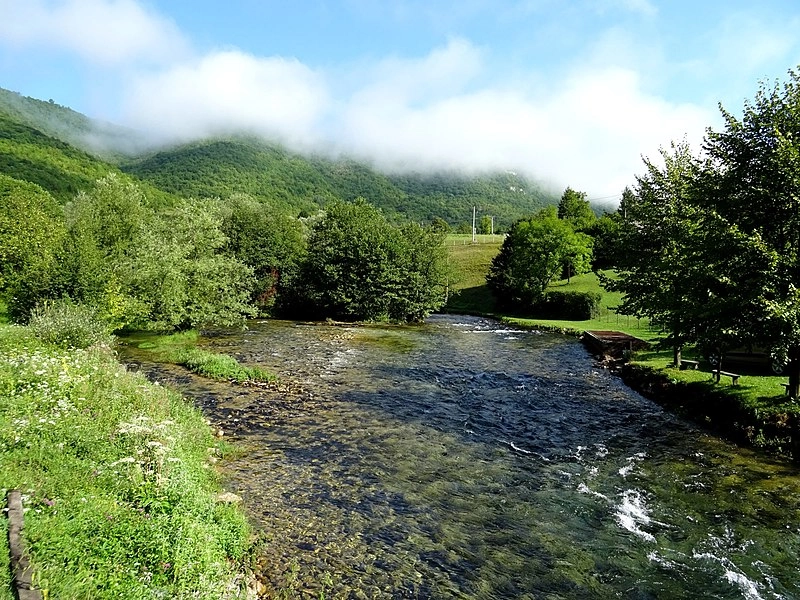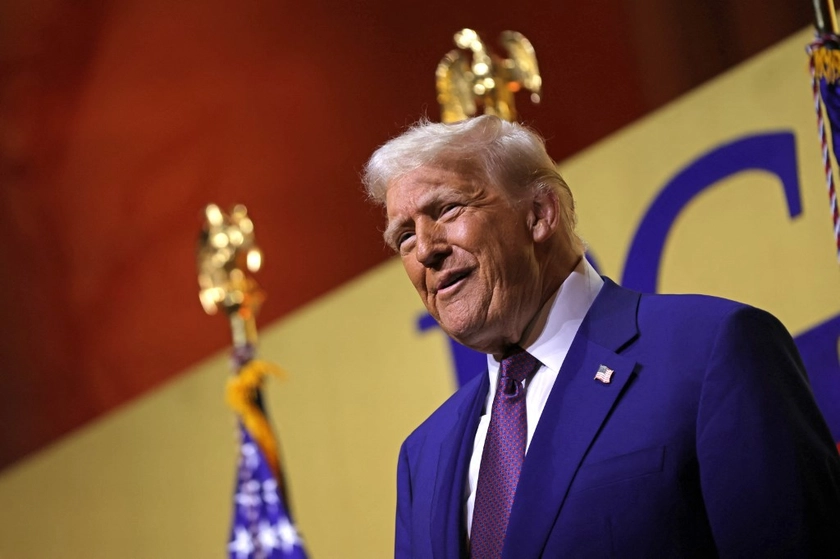Milorad Dodik is nothing short of an expert when it comes to attacks on the Bosnian state. Republika Srpska’s (RS) president has been hurtling the Serbian-dominated entity of Bosnia and Herzegovina ever closer toward secession over the past months. State institutions should be stripped of their power; decisions of the state’s highest court should cease to apply in RS. On Jan. 9, Dodik opened the celebrations to mark a holiday previously deemed unconstitutional by Bosnia’s Constitutional Court, with paramilitary formations and Putin’s Night Wolves taking part in the festivities. Secession is the main subject of Dodik’s propaganda, which even conjures up the specter of a new war.
For Dodik and his Alliance of Independent Social Democrats (SNSD) party, nationalist aspirations are by no means the only interests at stake here. The Bosnian-Serbian leadership uses its position of power primarily as a lucrative source of income: family members and party colleagues have been siphoning funds from state budgets for years – with no consequences from the domestic legal system.
JOIN US ON TELEGRAM
Follow our coverage of the war on the @Kyivpost_official.
The ethnic clans behave as though they owned the state. Hardly any jobs are awarded without one of these blocs having a say.
Bosnia and Herzegovina: despoiling of public resources by ethnonationalist clans
The success story of Dodik’s son Igor and daughter Gorica is the prime example: the two have been linked to the company Prointer, which landed public contracts valued at around 196 million convertible marks ($108 million) in recent years, according to an investigation by the business-oriented media outlet Capital. While Dodik repeatedly calls the existence of the Bosnian state into question through his (well-publicized) statements and actions, he and his family are making a fortune off public contracts with that very same state.

Trump Gives Europe 3 Weeks to Accept Ukraine’s ‘Surrender,’ Says European Lawmaker
In an effort to shut down the “patronage network” that makes this possible, US authorities placed Dodik’s children and their companies on a sanctions list in late October of 2023. The companies enjoy the patronage of public institutions, primarily in Republika Srpska, and have a virtual monopoly in several areas according to Ivana Korajlic, who heads up Transparency International’s Bosnian office.
Since the 1995 Dayton Accords, Bosnia-Herzegovina has been dominated politically and economically by three ethnically centered power blocs, all of which were involved in wartime dealings and crimes prior to the signing of the peace agreement. Like Dodik’s SNSD, the ethnonationalist Croatian Democratic Union (HDZ) and the Bosniak Party of Democratic Action (SDA) have been helping themselves to lucrative state contracts. Hardly any jobs are awarded without one of these blocs having a say in who gets them: the ethnic clans behave as though they owned the state.
Politics and business interests
Thus, systematic exploitation has become a leitmotif of the Bosnian political system. It is always the same pattern: alleged “national” interests of the three ethnic blocks are bound up with private and party-linked business deals. The result is a thriving business model for a small power clique in one of Europe’s poorest countries – to the detriment of the state and the general public.
The clans have proven quite inventive when it comes to plundering the country’s resources, with the theft of entire forests being a particularly provocative example, especially in the age of climate change. It has been calculated that two million cubic meters of wood are stolen from Bosnia’s forests each year, according to Anes Podic of the environmental organization Eko Akcija in Sarajevo. Near the town of Pale, for instance, the theft of wood on Jahorina Mountain, known as a site of the Sarajevo Winter Olympics, can be seen from far and wide. Environmentalists say that the involvement of high-ranking politicians is what makes it possible for the perpetrators to get away with criminal activity on this scale.
Bosnia-Herzegovina’s political leaders are not the only ones involved in the predatory over-exploitation of the country’s resources though: increasingly, international corporations are also taking part. For example, the company Adriatic Metals is gearing up for large-scale mining activities in Vares, a small town in the mountains not far from Sarajevo, the capital. The investments of the London-based corporation have been the target of criticism for months. Its Vares project was the subject of an open letter sent by five environmental groups to the US, UK and Norwegian ambassadors, who had expressed support for the planned mining project, even praising its “sustainability.” Observers on the ground take a different view: the environmentalists who have joined forces to fight the large-scale project say that, far from being sustainable, the mining project endangers landscapes that should be receiving protection.
Gold rush atmosphere – no concern for flora or fauna
The forest in and around Vares is considered an important habitat for wild animals, including bears and wolves. Activists complain that trees have been felled along stretches of the forest and point out that the authorities have altered existing land use plans in preparation for the mining activities. In this sense, the area of woodland endangered by the project is greater than was calculated for the project documentation, reports Prof. Samir Lemes from the NGO Eko Forum Zenica. The primary subject of Semes’ criticism is the lack of transparency regarding the planned mining activities. Officially, the plan is to extract zinc, lead, barite, and silver.
Environmental organizations lament that the community will be paying a high price: biodiversity and nature, including a protected virgin forest will be sacrificed in order to extract the mineral resources. Prof. Dalibor Ballian of the University of Sarajevo’s forestry faculty has determined that the preparatory work on the project has already resulted in animals leaving the region. The vegetation has changed and drinking water has been polluted, including that of a spring in the immediate vicinity of the mine. “The area is being transformed into an industrial desert,” warns the forestry expert.
A report by the internationally active NGO Bankwatch arrived at the same conclusion: 3,000 square meters of forest were “mistakenly” cleared in the “wrong place,” the NGO’s Pippa Gallopp protests. Bankwatch is also critical of the role of the European Bank for Reconstruction and Development in the project: the EBRD purchased shares in Adriatic Metals, the mining company, ignoring the documented environmental problems. Bankwatch sees this as a clear violation of the principles set down in the EBRD’s own environmental and social policy.
Caption River Pliva, in Bosnia, where gold was found.
Prospects for exorbitant profits
The glow of prospects for exorbitant profits is putting the questionable practices into the shade, though: Adriatic Metals has seen its stock prices shoot up 750 percent since 2018, according to Miningscout.de, an information portal for mining industry investors. The hype around mineral resources is in full swing – and international corporations are scenting lucrative opportunities in other parts of Bosnia as well. “An unbelievable amount of gold was found along the River Pliva,” Miningscout announced in early 2023, noting: “There is a gold-rush mood in the Balkans.” The Balkan states are becoming the new raw materials “hotspot,” according to the news portal.
Meanwhile, few are listening to environmentalists’ calls for compliance with international conventions on the protection of nature and the environment. Activists in Bosnia tell of visits by foreign diplomats who send out an unmistakable message that criticism of the large projects being planned, like that in Vares, is unwelcome. In the autumn of 2023, the Bern Convention’s Bureau requested the Bosnian authorities to enforce a halt to the activities in Vares until the complaint filed by environmental activists had received judicial consideration, something Adriatic Metals has simply ignored.
Certainly, representatives of Western states, who, in other contexts, not infrequently criticize the corrupt structures in the country and regularly call for measures to fight corruption, are now – with sought-after resources at stake – making common cause with the local and not infrequently corrupt politicians. Bosnia ranked 100th on Transparency International’s Corruption Perceptions Index for 2022 – on a par with Malawi and Sierra Leone.
The sleepy little Bosnian town of Vares is only one of many places to have caught the eye of companies, primarily European companies. There are reasons for this: in March 2023, the European Commission issued its proposal for a Critical Raw Materials Act, which is intended to help ensure the supply of raw materials important for supply chains and production processes. Brussels is seeking greater autonomy in raw materials extraction and above all to reduce the EU’s dependence on China in this sector.
Many in the Balkans have the impression that EU investors are happy to turn not just one, but two blind eyes to these issues there.
Is the EU sacrificing the Balkans on the altar of decarbonization?
The European Union’s strategic realignment is already having far-reaching negative effects on countries in Southeast Europe: in addition to the damage it does to the environment, metal extraction poses serious risks for local communities. The fact that the raw materials extracted are intended for use in the transition to more climate-friendly mobility does not make that any less objectionable. The portal Balkan Green Energy News pointed up this contradiction back in the summer of 2022, asking: “Is the EU to sacrifice [the] Balkans to secure resources for its energy transition?”
The environmentalist Lemes suspects that lithium also plays a role in the Vares project, although this has never been officially confirmed. Lithium is used in automotive battery production, so demand for the valuable material has skyrocketed with the e-mobility boom. Up to now, lithium extraction has been concentrated in Australia, Chile, China and Argentina, which have the largest known lithium reserves. Now the spotlight is on the hitherto untapped reserves in the Balkans.
In Bosnia, criticism of a double standard on the part of the West is growing steadily louder: while environmental protection and biodiversity are writ large in the EU, many in the Balkans have the impression that EU investors are happy to turn not just one, but two blind eyes to these issues there. Certainly, poorly developed democratic structures in the Balkan states and the countries’ key political players, whose interest in environmental protection issues is infinitesimally small, are making it easy for Western actors to pursue their economic interests.
Marion Kraske is a political scientist and publicist who has been working for decades nationally and internationally on the topics of right-wing extremism, nationalism and coming to terms with the past. She also focuses on the Balkan wars and the challenges of state- and nation-building in post-conflict contexts. Previously, she worked for DPA, SPIEGEL, ARD television and most recently as head of the Heinrich Böll Foundation in Sarajevo, Bosnia and Herzegovina.
Reprinted with permission from The Heinrich Boll Stiftung Green Political Foundation. See the original here.
The views expressed in this opinion article are the author’s and not necessarily those of Kyiv Post.
You can also highlight the text and press Ctrl + Enter












